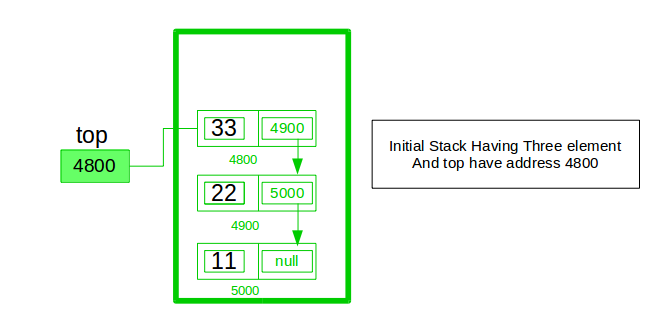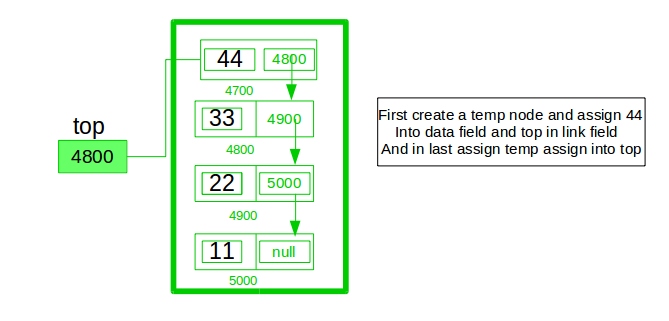使用单链表实现堆栈
要使用单链表概念实现堆栈,所有单链表操作都是基于堆栈操作 LIFO(后进先出)执行的,并且借助这些知识,我们将使用单链表实现堆栈。使用单链表,我们通过以节点的形式存储信息来实现堆栈,我们需要遵循堆栈规则并使用单链表节点来实现。所以我们在栈的实现中需要遵循一个简单的规则,即后进先出,所有的操作都可以在一个top变量的帮助下执行。让我们学习如何执行Pop,Push,Peek,Display操作下面的文章。



使用链表可以轻松实现堆栈。在堆栈实现中,堆栈包含一个顶部指针。这是堆栈的“头部”,其中推送和弹出项目发生在列表的头部。第一个节点在链接字段中具有空值,第二个节点链接在链接字段中具有第一个节点地址,依此类推,在“top”指针中具有最后一个节点地址。
在数组上使用链表的主要优点是可以实现一个可以根据需要收缩或增长的堆栈。在使用数组时会限制数组的最大容量,这会导致堆栈溢出。这里每个新节点都将被动态分配。所以溢出是不可能的。
堆栈操作:
- push() :将一个新元素插入堆栈,即在链表的开头插入一个新元素。
- pop() :返回堆栈的顶部元素,即简单地从链表中删除第一个元素。
- peek() :返回顶部元素。
- display():打印堆栈中的所有元素。
下面是上述方法的实现:
C++
// C++ program to Implement a stack
//using singly linked list
#include
using namespace std;
// Declare linked list node
struct Node
{
int data;
Node* link;
};
Node* top;
// Utility function to add an element
// data in the stack insert at the beginning
void push(int data)
{
// Create new node temp and allocate memory in heap
Node* temp = new Node();
// Check if stack (heap) is full.
// Then inserting an element would
// lead to stack overflow
if (!temp)
{
cout << "\nStack Overflow";
exit(1);
}
// Initialize data into temp data field
temp->data = data;
// Put top pointer reference into temp link
temp->link = top;
// Make temp as top of Stack
top = temp;
}
// Utility function to check if
// the stack is empty or not
int isEmpty()
{
//If top is NULL it means that
//there are no elements are in stack
return top == NULL;
}
// Utility function to return top element in a stack
int peek()
{
// If stack is not empty , return the top element
if (!isEmpty())
return top->data;
else
exit(1);
}
// Utility function to pop top
// element from the stack
void pop()
{
Node* temp;
// Check for stack underflow
if (top == NULL)
{
cout << "\nStack Underflow" << endl;
exit(1);
}
else
{
// Assign top to temp
temp = top;
// Assign second node to top
top = top->link;
//This will automatically destroy
//the link between first node and second node
// Release memory of top node
//i.e delete the node
free(temp);
}
}
// Function to print all the
// elements of the stack
void display()
{
Node* temp;
// Check for stack underflow
if (top == NULL)
{
cout << "\nStack Underflow";
exit(1);
}
else
{
temp = top;
while (temp != NULL)
{
// Print node data
cout << temp->data << "-> ";
// Assign temp link to temp
temp = temp->link;
}
}
}
// Driver Code
int main()
{
// Push the elements of stack
push(11);
push(22);
push(33);
push(44);
// Display stack elements
display();
// Print top element of stack
cout << "\nTop element is "
<< peek() << endl;
// Delete top elements of stack
pop();
pop();
// Display stack elements
display();
// Print top element of stack
cout << "\nTop element is "
<< peek() << endl;
return 0;
} Java
// Java program to Implement a stack
// using singly linked list
// import package
import static java.lang.System.exit;
// Create Stack Using Linked list
class StackUsingLinkedlist {
// A linked list node
private class Node {
int data; // integer data
Node link; // reference variable Node type
}
// create global top reference variable global
Node top;
// Constructor
StackUsingLinkedlist()
{
this.top = null;
}
// Utility function to add an element x in the stack
public void push(int x) // insert at the beginning
{
// create new node temp and allocate memory
Node temp = new Node();
// check if stack (heap) is full. Then inserting an
// element would lead to stack overflow
if (temp == null) {
System.out.print("\nHeap Overflow");
return;
}
// initialize data into temp data field
temp.data = x;
// put top reference into temp link
temp.link = top;
// update top reference
top = temp;
}
// Utility function to check if the stack is empty or not
public boolean isEmpty()
{
return top == null;
}
// Utility function to return top element in a stack
public int peek()
{
// check for empty stack
if (!isEmpty()) {
return top.data;
}
else {
System.out.println("Stack is empty");
return -1;
}
}
// Utility function to pop top element from the stack
public void pop() // remove at the beginning
{
// check for stack underflow
if (top == null) {
System.out.print("\nStack Underflow");
return;
}
// update the top pointer to point to the next node
top = (top).link;
}
public void display()
{
// check for stack underflow
if (top == null) {
System.out.printf("\nStack Underflow");
exit(1);
}
else {
Node temp = top;
while (temp != null) {
// print node data
System.out.printf("%d->", temp.data);
// assign temp link to temp
temp = temp.link;
}
}
}
}
// main class
public class GFG {
public static void main(String[] args)
{
// create Object of Implementing class
StackUsingLinkedlist obj = new StackUsingLinkedlist();
// insert Stack value
obj.push(11);
obj.push(22);
obj.push(33);
obj.push(44);
// print Stack elements
obj.display();
// print Top element of Stack
System.out.printf("\nTop element is %d\n", obj.peek());
// Delete top element of Stack
obj.pop();
obj.pop();
// print Stack elements
obj.display();
// print Top element of Stack
System.out.printf("\nTop element is %d\n", obj.peek());
}
}Python3
'''Python supports automatic garbage collection so deallocation of memory
is done implicitly. However to force it to deallocate each node after use,
add the following code:
import gc #added at the start of program
gc.collect() #to be added wherever memory is to be deallocated
'''
class Node:
# Class to create nodes of linked list
# constructor initializes node automatically
def __init__(self,data):
self.data = data
self.next = None
class Stack:
# head is default NULL
def __init__(self):
self.head = None
# Checks if stack is empty
def isempty(self):
if self.head == None:
return True
else:
return False
# Method to add data to the stack
# adds to the start of the stack
def push(self,data):
if self.head == None:
self.head=Node(data)
else:
newnode = Node(data)
newnode.next = self.head
self.head = newnode
# Remove element that is the current head (start of the stack)
def pop(self):
if self.isempty():
return None
else:
# Removes the head node and makes
#the preceding one the new head
poppednode = self.head
self.head = self.head.next
poppednode.next = None
return poppednode.data
# Returns the head node data
def peek(self):
if self.isempty():
return None
else:
return self.head.data
# Prints out the stack
def display(self):
iternode = self.head
if self.isempty():
print("Stack Underflow")
else:
while(iternode != None):
print(iternode.data,"->",end = " ")
iternode = iternode.next
return
# Driver code
MyStack = Stack()
MyStack.push(11)
MyStack.push(22)
MyStack.push(33)
MyStack.push(44)
# Display stack elements
MyStack.display()
# Print top element of stack
print("\nTop element is ",MyStack.peek())
# Delete top elements of stack
MyStack.pop()
MyStack.pop()
# Display stack elements
MyStack.display()
# Print top element of stack
print("\nTop element is ", MyStack.peek())
# This code is contributed by Mathew GeorgeC#
// C# program to Implement a stack
// using singly linked list
// import package
using System;
// Create Stack Using Linked list
public class StackUsingLinkedlist
{
// A linked list node
private class Node
{
// integer data
public int data;
// reference variable Node type
public Node link;
}
// create global top reference variable
Node top;
// Constructor
public StackUsingLinkedlist()
{
this.top = null;
}
// Utility function to add
// an element x in the stack
// insert at the beginning
public void push(int x)
{
// create new node temp and allocate memory
Node temp = new Node();
// check if stack (heap) is full.
// Then inserting an element
// would lead to stack overflow
if (temp == null)
{
Console.Write("\nHeap Overflow");
return;
}
// initialize data into temp data field
temp.data = x;
// put top reference into temp link
temp.link = top;
// update top reference
top = temp;
}
// Utility function to check if
// the stack is empty or not
public bool isEmpty()
{
return top == null;
}
// Utility function to return
// top element in a stack
public int peek()
{
// check for empty stack
if (!isEmpty())
{
return top.data;
}
else
{
Console.WriteLine("Stack is empty");
return -1;
}
}
// Utility function to pop top element from the stack
public void pop() // remove at the beginning
{
// check for stack underflow
if (top == null)
{
Console.Write("\nStack Underflow");
return;
}
// update the top pointer to
// point to the next node
top = (top).link;
}
public void display()
{
// check for stack underflow
if (top == null)
{
Console.Write("\nStack Underflow");
return;
}
else
{
Node temp = top;
while (temp != null)
{
// print node data
Console.Write("{0}->", temp.data);
// assign temp link to temp
temp = temp.link;
}
}
}
}
// Driver code
public class GFG
{
public static void Main(String[] args)
{
// create Object of Implementing class
StackUsingLinkedlist obj = new StackUsingLinkedlist();
// insert Stack value
obj.push(11);
obj.push(22);
obj.push(33);
obj.push(44);
// print Stack elements
obj.display();
// print Top element of Stack
Console.Write("\nTop element is {0}\n", obj.peek());
// Delete top element of Stack
obj.pop();
obj.pop();
// print Stack elements
obj.display();
// print Top element of Stack
Console.Write("\nTop element is {0}\n", obj.peek());
}
}
// This code is contributed by 29AjayKumarJavascript
输出:
44->33->22->11->
Top element is 44
22->11->
Top element is 22时间复杂度:
所有 push()、pop() 和 peek() 操作的时间复杂度为 O(1),因为我们没有对列表执行任何类型的遍历。我们只通过当前指针执行所有操作。